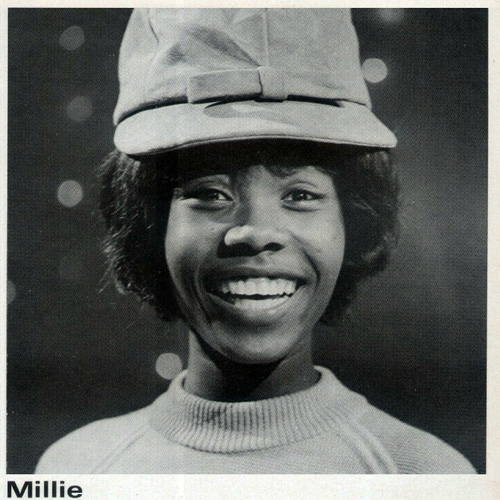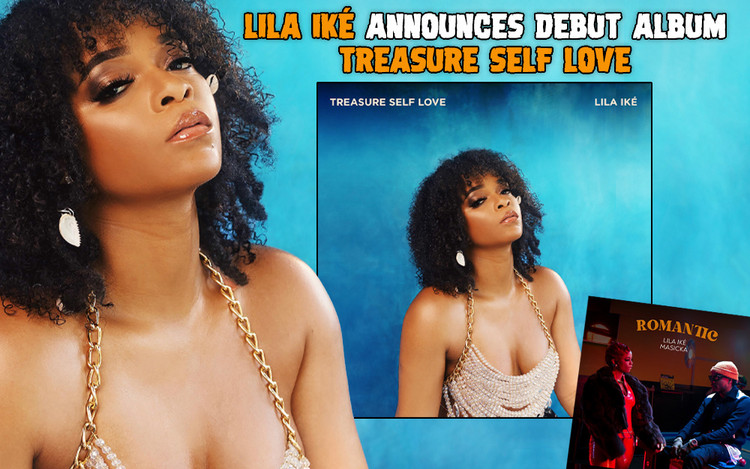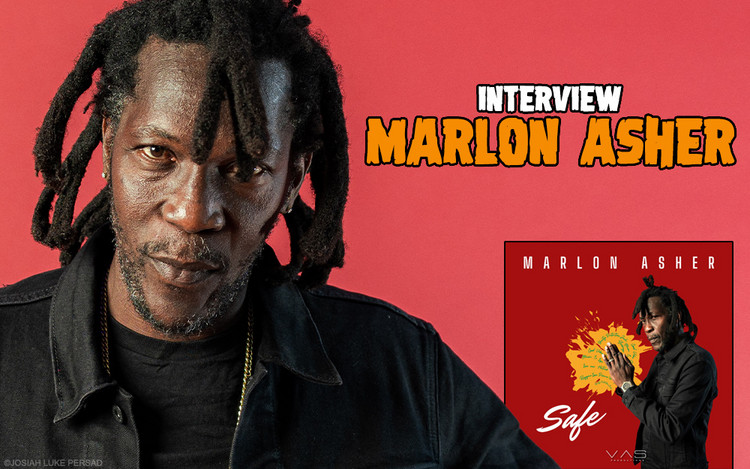Millie Small ADD

MILLIE SMALL (October 6, 1946 – May 5, 2020)
Millicent ‘Dolly May’ Small‘s story begins in the Milk River area in the district of Clarendon, a parish located in the south of Jamaica, where on 8th October 1946 she was born into a family of seven brothers and five sisters. Raised in a thatched shack in the plantation grounds where her father worked as a sugar plantation overseer, the family enjoyed few home comforts, yet managed to overcome any hardships and struggle through, with music a welcome and ultimately rewarding distraction.
By the age of twelve, Millie’s enchanting rendition of songs for friends and relatives had prompted her entry into local talent contests, a move that ultimately resulted in the young girl taking first place in the final of the Vere John’s Opportunity talent contest at the Palladium Theatre in Montego Bay. It was also around this time she moved to an aunt’s in downtown Kingston, the relocation enabling the aspiring young performer access to the growing number of local record producers establishing their credentials as architects of the island’s recording industry.
Leading the pack was a hungry young sound system operator-turned-music maker, Clement ‘Coxson’ Dodd, who upon hearing Millie perform was struck by the similarity of her voice to that of Shirley Mae Goodman, half of famed R&B duo Shirley & Lee, whose music remained popular on the Jamaican scene despite their demise Stateside.
Dodd suggested the teenage hopeful pair up with Owen Gray, who subsequently tutored her on vocal technique, harmony and timing, before uniting with her on disc for a handful of sides that included ‘Sit And Cry’, Do You Know’ and ‘Sugar Plum’, the latter being a significant hit as the summer drew to a close. But Gray still harboured ambitions as a solo performer and the union proved short-lived, with Millie teaming up with another aspiring local singer, Samuel Augustus ‘Roy’ Panton soon after. By early 1962, Roy & Millie were regularly performing together, with the pair making their first recording session together for rookie producer, Roy Robinson, with the resultant ‘We’ll Meet’ promptly becoming a major hit on the island for his E&R imprint.
The success of the duo’s debut disc spurred Dodd to take a more active roll in her career development and over the ensuing months he arranged for the pair to cut further popular 45s. Yet while Roy & Millie were fast becoming one of the island’s leading acts, financial recompense from their recorded work remained meager and early in ’63, the pair switched producers, commencing a brief spell for Lindon Pottinger‘s Gay Disc Records, a association that spawned further popular sides in ‘Oh Merna, ‘Oh Shirley’ and ‘Marie’, the latter becoming one of the biggest-selling Jamaican singles that summer.
Following their fleeting sojourn with Pottinger, the duo commenced work with Prince Buster, their initial session resulting in the worthy single, ‘I’ll Go’ b/w ‘Over And Over’, but as the disc climbed the national radio charts, events elsewhere were determining the young girl’s long-term future. Across the Atlantic in London, Anglo-Jamaican record entrepreneur Chris Blackwell had been made aware of Millie’s potential, with his West Indian music company, Island Records, issuing the bulk of her output to date, as his business partner, Graeme Goodall later recalled:
“When Chris heard ‘We’ll Meet’ by Roy & Millie, he called me and told me to get Millie to London. He also spoke to Leslie Kong…. also a 24% shareholder in Island Records… to ask for his help. Les also saw the commercial value in Millie’s voice and style, but I, typically, was not convinced. Les [Kong] took the ball. A very difficult job was locating Millie’s father. Millie’s mother was hesitant but eventually agreed. We got all the paper work together and I took her for a passport photo and the passport was issued. I advanced the money for an economy class ticket, BOAC’. So that Chris could sign contracts etc., on Millie’s behalf, he got ‘legal guardianship’, with permission from her mother…. again with Les Kong’s efforts. Remember, she was only 16 or 17 year’s old.”
Once in the UK, Blackwell set about training her for stardom, enrolling his young ward at the Italia Conti Stage School for speech training and dancing lessons.
In the meantime, Millie experienced her first taste of life on the road in Britain, before attending her first session, cutting three overtly pop-friendly numbers at Olympic Studios in Carlton Street, central London. By this time Blackwell had become involved with a record production company that had ambitions to become a major force in the Pop market. Once more, Graeme Goodall explained:
“[Chris] was involved with Harry Robinson and a guy called Chris Peers, who at one time was the director of Island’ they had a small production company called B.P.R. [Blackwell ‘ Peers ‘ Robinson], which was a side issue and didn’t really go through Island Records'”
In December ’63, Fontana Records released the first of Millie’s UK-produced singles, the self-composed ‘Don’t You Know’, coupled witha Harry Robinson original entitled ‘Until You’re Mine’, with a third track from the Olympic sessions, ‘Oh Davy’ remaining unissued.
Unfortunately for Fontana, the single quick sank without a trace, but despite this inauspicious start, Blackwell remained convinced of the singer’s potential and arranged another session, enlisting respected Jamaican jazz guitarist, Ernest Ranglin to oversee proceedings. Also present at the second Olympic session were the Five Dimensions, a London-based combo making their name on the capital’s thriving R&B scene as the backing band for singer-harmonica player Jimmy Powell.
The session produced a number of ska-flavoured sides, including an irresistible version of ‘My Boy Lollypop’, a song first recorded in 1958 by a relatively unknown US Rock & Roller, Barbie Gaye. Coupled with a Tony Washington song entitled ‘Something’s Gotta Be Done’, ‘My Boy Lollipop’ saw issue in February and quickly picked up radio airplay on national, regional and pirate stations, its joyous mixture of ska and pop proving an irresistible combination for the British public at large.
A series of high-profile media appearances followed and by the beginning of May 1964, ‘My Boy Lollipop’ had sold 300,000 copies, with the record propelled to the second spot in the national listings. At the end of the month the record entered the US Billboard Singles chart, swiftly climbing to the second spot, spending a total of twelve weeks on the national Pop listings.
The single’s phenomenal success was repeated around the globe, with Millie widely acclaimed as the Caribbean’s first international recording star and every major record company frantically searching in vain for another performer of similar appeal. None the less, their efforts did succeeded in introducing a multitude of Jamaican acts to listeners the world over, with the likes of the Maytals, Prince Buster and Laurel Aitken just a few of those given unprecedented mainstream exposure.
On 15th June, the long awaited follow-up was released by Fontana. The single paired the eminently catchy ‘Sweet William’ with ‘Oh Henry’, a song written by Millie and fellow Jamaican ex-pat, Wilfred Jackie Edwards in honour of her newly acquired puppy dog. Having taken orders of 100,000 copies before its official release, much was expected of the latest offering from Jamaica’s much-heralded ‘Queen Of Blue Beat’ and the PR machine duly went into overdrive. As a result, the ‘Lollipop Girl’ rarely spent consecutive nights in the same location and yet for all her tireless work and the record’s undoubted appeal, ‘Sweet William’ stalled at number 30 in the Pop Parade, its failure to breach the top 20 regarded as a major disappointment for all concerned.
Soon after, ‘Sweet William’ entered the Billboard top 100, but as in Britain, early optimism for another top 5 hit for the singer labelled by the American press as ‘Blue Beat Girl’ soon dissipated, with sales falling off sharply and the disc managing a modest number 40 on the national chart.
Back in the UK, Fontana released the singer’s first UK album, ‘More Millie’, a ska-heavy collection of dozen recordings primarily from the Ernest Ranglin-arranged sessions that featured the quartet of sides from her previous two hit singles, alongside an array of up-beat covers.
Over the next few years, Millie maintained a gruelling schedule comprised of innumerable public performances and a series of recording sessions, with her output from this period varying from out-and-out pop to northern soul. She also worked closely with Jackie Edwards, whom she accompanied on a number of singles and LPs aimed squarely at the West Indian market.
In 1968, her agreement with Chris Blackwell finally expired and in February 1969, she signed a one-year deal with Decca Records, subsequently working with the company’s respected in-house producers, Dick Rowe and Ivor Raymonde on a session that produced a quartet of sides of which ‘Readin’, Writin’, Arithmetic’ and ‘I Want You Never To Stop’ saw release back-to-back late in June.
The commercial failure of the Decca single and the growing popularity of the latest sound from Jamaica convinced Millie’s then partner, Eddie Wolfram that a new approach was required, and after enlisting the services of leading UK reggae act, the Pyramids (aka Symarip), he assumed the role of producer. The arrangement spawned an excellent version of Jackie Edwards’‘My Love And I’ along with an original number entitled ‘Tell Me All About Yourself’, which were licensed Graeme Goodall‘s Jamaican music company, Doctor Bird Records and issued on its Pyramid subsidiary in December ’69. Unfortunately, the timing could not have been worse as Doctor Bird promptly folded soon after, its sudden demise ending any hope of chart action for the single.
Disappointed, but undaunted, Wolfram and Millie turned to Trojan Records, the UK’s biggest and most successful reggae concern, which upon securing her signature scheduled the release of her next 45, the double-A side – a competent rendering of Nick Drake’s ‘Mayfair’ c/w the overtly political ‘Enoch Power’. Given the prevailing mood of the times it was not surprising the whimsical top-side was largely overlooked in favour of the more strident flip; a seemingly playful song that in fact conveyed a message of unity and defiance against the views espoused Enoch Powell’s recent ‘Rivers Of Blood’ speech. Despite the song being denied radio airplay, it greatly enhanced Millie’s credibility, its popularity leading to an invitation to appear at the prestigious Caribbean Music Festival at Wembley Arena the following month.
April 1970 also saw the release of ‘Time Will Tell’, her first solo LP for five years. Something of a mixed bag, the album had some fine moments, but Wolfram’s arrangements too often hindered, rather than enhanced the material, particularly with his use of a brass ensemble that frequently sounded more Salvation Army than Muscle Shoals.
Around this time, Trojan also issued ‘Millie & Her Boyfriends’, a collection of early duets, originally released on Island prior and shortly after her move to the UK, while the ‘Pledging My Love’ and ‘Best Of Millie Small’ albums, which had first seen issue on Island were also re-released by the company of which her former mentor, Chris Blackwell was a major shareholder.
On the face of it, Trojan seemed a natural home for the singer, so it came as a surprise to many when that August, President Records announced the acquisition of her signature. Soon after, Ed Kassner‘s London-based independent released ‘We’re All In A Zoo’ b/w ‘Piccaninny Man’, but after a disappointing response, Millie returned to Trojan, reuniting with old label-mate Jimmy Cliff, who produced her next 7′, ‘Honey Hush’ – a superior piece of pop-reggae that could and should have led to further such works. But for reasons yet to be clarified, it heralded an abrupt end to her relationship with Trojan and her recording career as a whole.
In 2006, after two decades of virtual anonymity, the Jamaica Gleaner announced Millie had finally commenced recording, although ten years on the world still awaits her long overdue comeback.
Those foolish enough to dismiss Millie Small and her music as a poor imitation of the genuine article should familiarise themselves with the facts, for her achievements are both considerable and manifold. She was Jamaica’s first international recording star and its first and most successful female performer to-date,whose recordings helped pave the way for other, more celebrated acts to follow.
Since ‘My Boy Lollipop’ first became a global hit over 50 years ago, the record has sold an estimated seven million copies, is ranked third in the greatest hit singles for 1964 and recently placed fifth in a national poll for the most popular Jamaican singles of all time.
All things considered it is not an inconsiderable list of achievements for a plantation worker’s daughter from Clarendon.
by LAURENCE CANE-HONEYSETT - TROJANRECORDS.com









